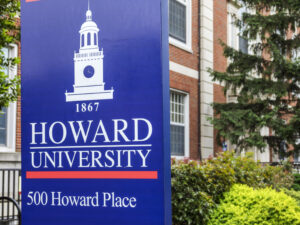
Howard University Law School may find itself in a courtroom pending a racial discrimination lawsuit filed by former student Michale Newman. He is asking for $2 million in compensation.
Newman, a white student, began his journey at the private HBCU in Washington in the fall of 2020 but was expelled from the law school in September 2022 for violating the university’s code of conduct following issues in the classroom and with social media.
Statements made on a class GroupMe chat by Newman included, “Where I part with the Black community is where they believe government solves problems, I only see it causing problems,” along with other opinions regarding Black voters choosing “the same party every election” sparked the initial outrage from his colleagues.
The uproar gained traction among students and faculty, which caused more tension between the plaintiff and his cohort. However, Newman tried to apologize and better understand how his statements may have offended his peers. An offensive tweet resurfaced from Newman’s Twitter account, fueling the fire.
In January 2021, the one-year-old tweet displayed a widely recognized image depicting Slave Gordon, with an extremely tattered back and caption reading, “But we don’t know what he did before the picture was taken!”
The post quickly circulated in the Howard community, with Newman receiving immense backlash. He combated the issues by writing a four-part email letter to his classmates and meeting with administration members to address racial discrimination.
The dean of Howard Law School, Danielle Holley, suggested Newman transfer from the university and his complaints were “a waste of university resources.”
In a “town hall” Zoom meeting spearheaded by Holley, over 300 participants joined. Many students voiced concerns about the ongoing issues resulting from Newman’s statements and other actions, claiming distraction from their studies, hurtful and insensitive.
Newman raised his hand at the meeting in defense of himself but was denied the opportunity to speak on several occasions, and chat features were removed when his comment was made until later in the meeting.
Racial epithets such as “Mayo King” and “Keebler Cookie” were used to describe Newman on different social platforms by students, who could not see past Newman’s earlier comments even though he said he wanted to uplift communities of color educationally and economically.
Issues leading to the spring 2022 semester hearings that concluded with Newman’s expulsion on grounds including violation of the student code of conduct. But to Newman, the extreme disciplinary action felt like a personal vendetta stemming from a difference of viewpoints and years of inequitable treatment by the board and administration.
With claims that the incidents beginning in Newman’s first year of law school caused his grades to suffer, resulting in the loss of his scholarship, depression and suicidal thoughts. Among his claims: a violation of Title VI of the Civil Rights Act of 1964, including retaliation, hostile educational environment, and disparate treatment.
Jason Thomas, a fourth-year strategic legal management communication major at Howard, says the lawsuit is unfair.
“For a white student to come into a space created for Black students and claim discrimination is disappointing,” Thomas said. “A white student is exploiting that system and using discrimination to seek financial gain.”
A review of affirmative action rulings by the Supreme Court has minority students like Thomas concerned about the future now that white students are weaponizing discrimination to combat admittance into schools on the basis of race.
“I’m scared to see affirmative action be struck, and it may limit opportunities for me,” Thomas said. “We are going to see who is serious about having a diversity pipeline because they [schools and corporations] won’t be forced or incentivized to continue to reach underrepresented students.”
Aliya Everett, the 116 Miss Florida A&M University, faced racial discrimination soon after being crowned.
Students brought up Everett’s biracial [Caucasian and Black] ethnicity as a reason to diminish her place as a fair-skinned woman representing an HBCU.
The historical relations between colorism, skin tone and social treatment in the Black community reveal a deep rift that still exists today, even on HBCU campuses built to defy discrimination and prejudice.
Everett wishes FAMU and all HBCUs would educate students more on the diversity of its student body.
“I know we talk about it, but we should dive deeper into it, so the campus is aware of the differences in culture and ethnicity in our beautiful student body … in hopes of making a difference in how minority students are treated on campus,” Everett said.